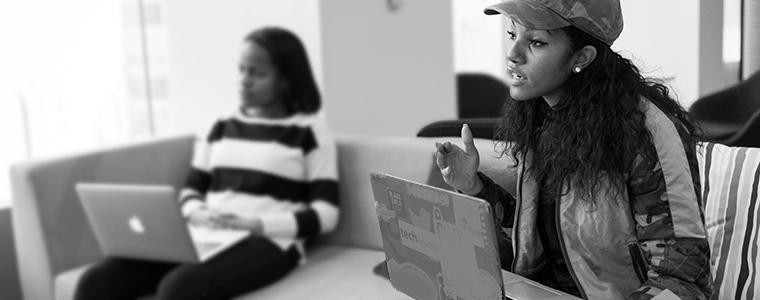The new etiquette for working together

by Jenny Holt
The work landscape is changing. Shared offices, coworking spaces, and even the coffee shop freelance scene has created a situation in which people that work for themselves have more opportunities than ever for collaboration. But there is a fine balance between working together and bothering someone. Here’s how to walk that line.
Look for clues
Is the person in the chair next to you typing quickly, in the zone, with headphones on or a sweatshirt hood up? This is non-verbal communication for “do not disturb.” Yet people often work in shared spaces because they enjoy the social stimulation. If you want to chat, the individuals who are looking around, making eye contact, or standing in line at the coffee bar are probably open to interaction.
Gretchen Spreitzer, Peter Bacevice, and Lyndon Garrett, writing for the Harvard Business Review, point out that one of the benefits of a coworking space is that “socializing isn’t compulsory or forced.” Everybody there has the ability to isolate or engage, depending on his or her workload and preferences. For this to work, however, all members of the community need to be able to look for social cues and act on them. Sometimes this means avoiding engagement until you’re sure it is welcome.
Respect your coworker’s space
When someone is under a deadline, it is important to give them the space they need so that they can remain focused. If you often work at the same shared space, you will likely get to know your coworker’s routines and might inadvertently discover the most opportune time to engage. If not, you can simply ask them. Try saying something like, “I would love some advice, is now a good time?” This gives them the opportunity to decline.
The opportunity to decline gracefully is a particularly important point. In a shared space, chances are you’ll come to spend a lot of time around the same people. And, chances are, most of those people will be professional and polite to you. While that can be a nice start to friendship, don’t expect that everyone is ready to be your best friend. Given the day-to-day nature of the relationship, the neighborly thing to do is to give people an “out” when you approach them – and this goes double if you’re asking something of them.
Reciprocate
Collaboration is a two-way street. If someone in your space offers to help with, say, content creation for your blog, start thinking about what you can do in return. It might be something as simple as offering to read over a newsletter they’re sending out or lending an ear when they’ve asked for some advice.
Engage in dialogue
The relationships that form in coworking spaces are unique in that they cross disciplines. A freelancer within one industry will probably find themselves sitting next to someone from an entirely different field. This can lead to powerful discussions, which help people to see things from a new perspective and generate fresh ideas. Your average person at a coworking space is likely open to these conversations – that is, when they have the time and inclination.
As the workplace changes, so must our social skills. Are you a freelancer working in a shared space? The new rules of the game require you to be adept at reading the body language of those around you. Are you new to coworking? Give yourself a basic coworking primer so you know what to expect. Respect your coworker’s space, remember to reciprocate favors, and be a decent citizen by being thoughtful about the way you engage.